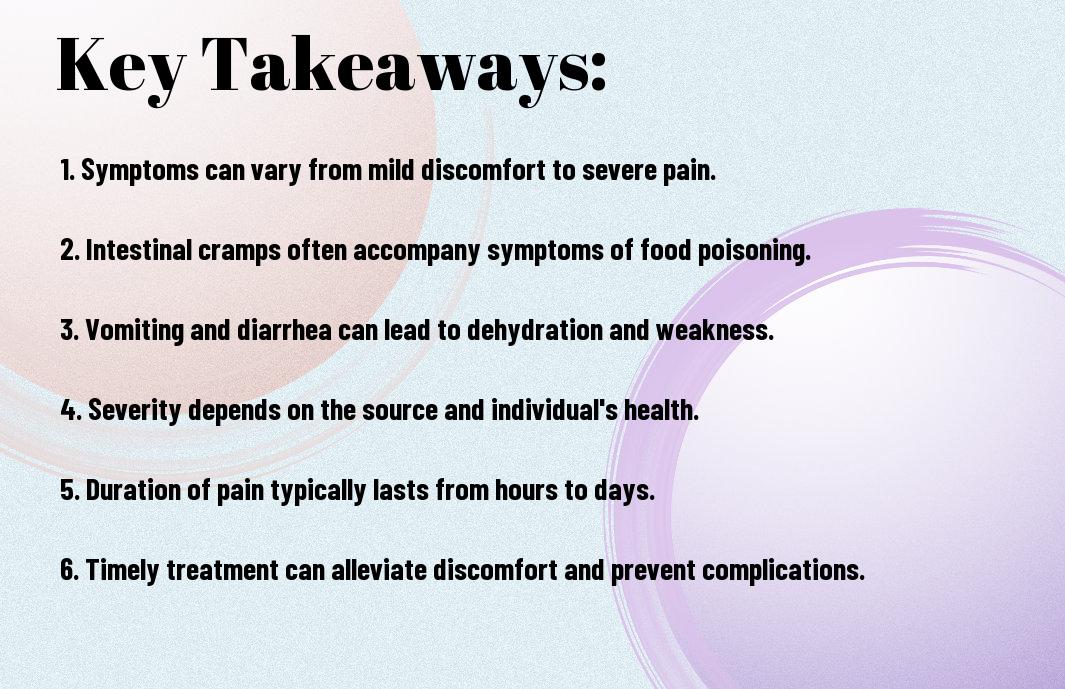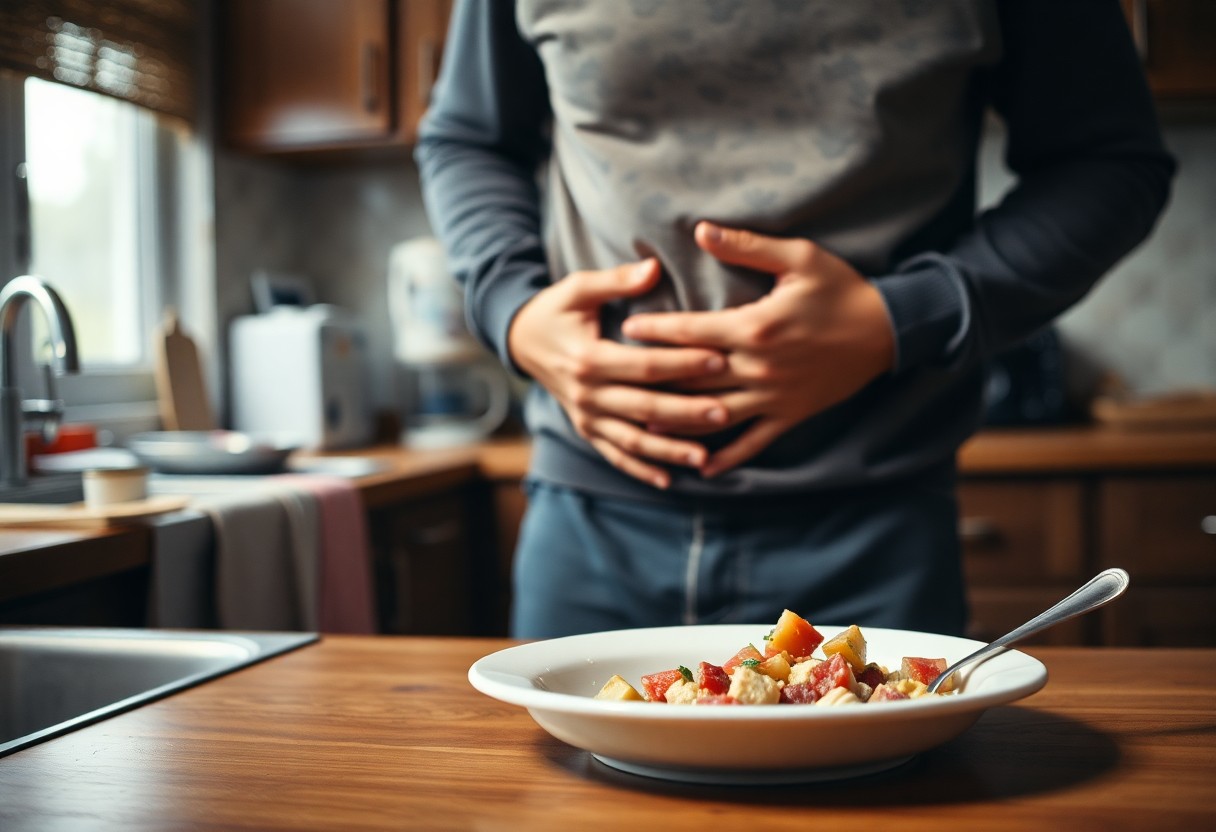Food poisoning can strike unexpectedly, leaving you feeling debilitated and uncomfortable. When bacteria, viruses, or parasites enter your digestive system through contaminated food or water, you may experience a range of painful symptoms, from severe abdominal cramps to relentless nausea. Understanding the intensity and duration of these symptoms can help you better manage the situation should it arise. In this post, we’ll explore the various manifestations of food poisoning and what you can do to alleviate your suffering.
Key Takeaways:
- Severity of Symptoms: Food poisoning can result in a range of symptoms, from mild discomfort to severe pain, depending on the cause and individual health factors.
- Common Symptoms: Typical symptoms include nausea, vomiting, diarrhea, and abdominal cramps, which can be extremely painful and debilitating.
- Duration of Illness: While many cases of food poisoning resolve within a few days, the pain and discomfort can linger, especially in severe cases or for those with weakened immune systems.
Understanding Food Poisoning
A foodborne illness, commonly known as food poisoning, occurs when you ingest contaminated food or beverages. It can lead to discomfort and serious health issues. To better equip yourself against this condition, you can Fight Off Food Poisoning. Knowing the facts about food safety is necessary to minimizing your risk of exposure.
Common Causes
Causes of food poisoning primarily include bacteria like Salmonella and E. coli, as well as viruses such as Norovirus. Contaminated food can originate from improper handling, inadequate cooking, or cross-contamination during food preparation. It’s vital to be aware of proper food storage and hygiene practices to reduce the risk of these pathogens.
Symptoms to Watch For
Common symptoms of food poisoning include nausea, vomiting, diarrhea, stomach cramps, and fever. These signs typically appear within hours or days after consuming contaminated food, and their severity can vary based on the specific type of bacteria or virus involved.
Also, staying vigilant about your symptoms is necessary, as they can sometimes escalate quickly. If you experience severe dehydration, persistent vomiting, blood in your stools, or a high fever, you should seek medical attention promptly. Understanding these concepts will empower you to recognize and address food poisoning effectively, ensuring better health outcomes.

The Pain Experience
Clearly, the pain stemming from food poisoning can be overwhelming and distressing, affecting your entire body. It often manifests through various symptoms, creating an uncomfortable experience that can last for hours or days.
Types of Pain Associated with Food Poisoning
Clearly, food poisoning can induce several types of pain, which can vary in intensity and location:
- Abdominal cramps
- Nausea and vomiting sensations
- Diarrhea-related discomfort
- Headaches
- Muscle aches
Thou may find yourself experiencing a combination of these pains, making it vital to identify them promptly.
| Type of Pain | Description |
| Abdominal Cramps | Intense, gripping sensations in the stomach area. |
| Nausea | Discomfort leading to the urge to vomit. |
| Diarrhea | Frequent, loose bowels causing tenderness. |
| Headaches | Pain or pressure around the head and temples. |
| Muscle Aches | General discomfort in various muscle groups. |
Duration and Intensity of Symptoms
Against popular belief, food poisoning symptoms can last much longer than just a few hours. The duration and intensity of your symptoms depend on several factors, including the type of pathogen you encountered, your health status, and the amount of contaminated food consumed.
The severity of your food poisoning can lead to symptoms ranging from mild discomfort to debilitating pain. Most commonly, symptoms will resolve within 24 to 48 hours, but in more severe cases, you might experience lingering effects. Weakness, dehydration, and bloating could haunt you for days after the initial episode, emphasizing the importance of adequate hydration and recovery strategies.
Risk Factors
Keep in mind that food poisoning can affect anyone, but certain factors increase your risk. These include:
- Improper food handling.
- Consuming undercooked meats.
- Eating raw or unpasteurized dairy products.
- Ignoring expiration dates on food labels.
- Weakened immune system.
The combination of these factors can significantly elevate your likelihood of experiencing foodborne illness.
Vulnerable Populations
Beside general risks, certain groups of people are particularly susceptible to food poisoning. These vulnerable populations include young children, elderly individuals, pregnant women, and those with compromised immune systems. Your body may not recover as quickly as others, making caution even more necessary in food choices.
Types of Foods Most Likely to Cause Illness
To understand what can lead to food poisoning, consider the types of foods that are most commonly linked to illness:
- Raw or undercooked meats.
- Raw eggs.
- Shellfish.
- Unwashed fruits and vegetables.
- Prepared foods left at room temperature.
Thou should also be aware that these foods require proper preparation and storage to minimize risks.
| Food Type | Common Illnesses |
|---|---|
| Raw or Undercooked Meats | E. coli, Salmonella |
| Raw Eggs | Salmonella |
| Shellfish | Norovirus, Vibrio |
| Unwashed Produce | Giardia, Listeria |
| Room Temperature Foods | Staphylococcus, Clostridium |
Vulnerable individuals face elevated risks when consuming high-risk foods. Ensuring these foods are properly cooked and handled is particularly important. You can further protect yourself by adhering to food safety guidelines.
- Thoroughly cook meat and eggs.
- Wash fruits and vegetables.
- Store perishable items promptly.
- Avoid unpasteurized products.
- Maintain good hygiene when preparing food.
Thou should aim to follow these practices to safeguard your health.
| Practice | Benefits |
|---|---|
| Cook Thoroughly | Kills harmful bacteria |
| Wash Produce | Reduces contamination |
| Store Properly | Prevents spoilage |
| Avoid Cross-Contamination | Stops bacteria spread |
| Practice Good Hygiene | Minimizes foodborne diseases |
Prevention Strategies
All foodborne illnesses can be avoided by implementing proper prevention strategies. Ensuring that you stay informed about Food poisoning risks and taking safe practices seriously is key. Regularly washing hands, cooking food to appropriate temperatures, and storing items correctly can dramatically minimize the risk of contamination and illness.
Safe Food Handling Practices
The safety of your food largely depends on how you handle it. Always wash your hands before and after preparing food, use separate cutting boards for raw meat and vegetables, and cook foods to their recommended temperatures. These small steps can make a big difference in preventing harmful bacteria from affecting your health.
Importance of Hygiene
Below these safe practices, maintaining hygiene in your kitchen and dining areas is crucial. Regularly cleaning surfaces, utensils, and your hands helps eliminate bacteria and reduces the risk of food contamination. You should also be mindful of your preparation habits, ensuring that anything that has come into contact with raw products is properly sanitized before it touches ready-to-eat foods.
Indeed, prioritizing hygiene in your food preparation routine not only protects your health but also contributes to the well-being of anyone sharing your meals. By making cleanliness a habit, you’re minimizing potential exposure to harmful pathogens and creating a safer eating environment. Your awareness and efforts in maintaining hygiene can significantly enhance food safety for you and your loved ones.

When to Seek Medical Attention
Many individuals may experience mild food poisoning that resolves on its own, but it’s important to know when to seek medical care. If you experience persistent symptoms like high fever, severe dehydration, or prolonged vomiting, consulting a healthcare professional is important. Additionally, if symptoms last more than 48 hours or if you have a weakened immune system, prompt medical attention is advised to prevent complications.
Warning Signs of Severe Food Poisoning
Beside typical symptoms like nausea and diarrhea, severe food poisoning can present warning signs that require your immediate attention. Look for symptoms such as blood in your stools, persistent abdominal pain, high fever (above 101.5°F), and inability to keep fluids down. If you notice any of these signs, it’s important to seek medical care promptly to prevent further health issues.
Treatment Options Available
Options for treating food poisoning vary based on severity and underlying causes. Mild cases can often be managed at home with rest, hydration, and over-the-counter medications. However, more severe cases may require medical intervention, including intravenous fluids, anti-nausea medications, or antibiotics if a bacterial infection is diagnosed. Always consult with a healthcare professional to determine the best treatment course for your situation.
Seek guidance from a healthcare provider if your symptoms worsen or do not improve with home treatment. They may recommend specific therapies, such as hydration solutions to replenish lost fluids or prescription medications to combat severe nausea or diarrhea. Timely intervention can significantly improve your recovery process and help you get back to your daily activities sooner.
Summing up
Presently, experiencing food poisoning can be an intensely painful ordeal, impacting you physically and emotionally. Symptoms such as severe abdominal cramps, vomiting, and diarrhea can leave you feeling drained and vulnerable. The discomfort can disrupt your daily activities and cause significant distress. It’s important to understand that while food poisoning may vary in severity, seeking prompt medical attention when symptoms persist is vital for your recovery and well-being. Taking preventive measures in food handling can help reduce your risk of future incidents.
FAQ
Q: What are the common symptoms of food poisoning?
A: Common symptoms of food poisoning include nausea, vomiting, diarrhea, stomach cramps, fever, and fatigue. Symptoms can vary based on the type of contaminant and the individual’s health. Most symptoms usually appear within hours or days after consuming contaminated food or beverages.
Q: How painful can food poisoning be?
A: Food poisoning can cause significant discomfort. Symptoms like stomach cramps and abdominal pain can range from mild to severe, depending on the severity of the contamination. While some people may experience only mild discomfort, others may have intense pain that requires medical attention, especially if it persists.
Q: Is food poisoning always accompanied by pain?
A: Not everyone experiences pain with food poisoning. Some individuals may have primarily gastrointestinal symptoms like diarrhea and vomiting without significant abdominal pain. However, many people do report discomfort or cramping as part of their overall symptoms.
Q: How long does the pain from food poisoning typically last?
A: The duration of pain associated with food poisoning can vary. Generally, pain and other symptoms may last anywhere from a few hours to several days. In mild cases, symptoms may resolve quickly, but in more severe cases, they can take longer and may require medical intervention.
Q: When should I seek medical help for food poisoning pain?
A: It is advisable to seek medical attention if the pain is severe, if symptoms don’t improve within a couple of days, or if you experience high fever, blood in stools, or dehydration. These could indicate a more serious condition that requires professional care.


